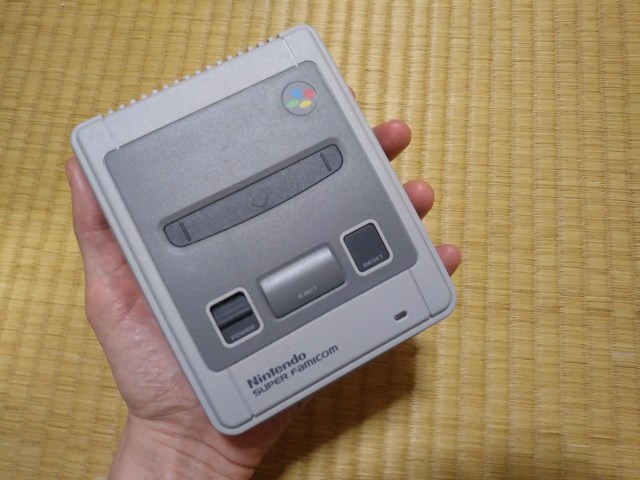
Tiny-scale operation for pint-sized retro console resales is still too big for Japanese police to look the other way.
Nintendo’s Classic Mini Super Famicom, the Japanese-spec version of the Super NES Classic Edition, is a pretty cool piece of tech. The self-contained retro system has 21 old-school games stored inside, which should be enough to keep anyone with an appreciation of the hobby’s history, or just fun, straightforward gameplay, entertained.
But 39-year-old Tomoyuki Miyamoto, a resident of Kashima in Ibaraki Prefecture, felt the Mini Super Famicom could use a bit of a tune-up. Since it’s got the processing power to run any Super Famicom/Super NES game, Miyamoto decided to add in the ROMs for a few more.
Had he stopped there and simply enjoyed his upgraded system in the comfort of his own home, he probably wouldn’t have gotten in trouble. Unfortunately, Miyamoto’s next move was to offer his upgraded Mini Super Famicom for sale through an online auction site. Between April and May, he sold three systems, with his total income from them coming to 61,500 yen (US$540), a pretty nice profit margin on the 24,000 yen it would have cost him to but the systems new, since they retail for 8,000 yen in Japan.
But Miyamoto’s entrepreneurial spirit didn’t impress law enforcement, and he was arrested on November 19 by officers attached to the Yasugi Precinct in Shimane Prefecture, way on the other side of the country (where ostensibly one of Miyamoto’s customers was located). He now faces charges stemming from violations of Japan’s trademark and copyright laws. Miyamoto has admitted to selling the systems, which he says he modified himself, implying that no one else was involved in his money-making scheme.
Given that his customers were willing to pay more than double the cost of a regular Mini Super Famicom, you might be imagining that Miyamoto stuffed them full of the entire catalog for the 16-bit system. Actually, though, he added a mere five games to the systems, with their copyrights split between four publishers. And though there are exactly five different games in the pre-bundled lineups for the Japanese and overseas versions of the retro console, Miyamoto wasn’t trying to create some best-of-both-worlds hybrid by combining their two libraries. One of the games he added is reported to be plain-old Super Mario Bros., which wasn’t even released in a stand-alone version for the Super Famicom/Super NES, so it’s unclear if Miyamoto slapped the 8-bit NES game into the 16-bit retro box or simply cut out the Super Mario Bros. portion that was one-fourth of the 16-bit Super Mario All-Stars remake bundle and tossed away the rest.
Either way, despite the relatively minor scale of the operation and modest economic gains it brought Miyamoto, it was still enough to get arrested, serving as another example of how the Japanese justice system doesn’t give video game bootleggers much leeway, even if they have the same last name as Mario’s creator.
Source: Asahi Shimbun Digital via Hachima Kiko
Top image ©SoraNews24

 Super Mario creator Shigeru Miyamoto performs Mario theme with hip hop’s The Roots 【Video】
Super Mario creator Shigeru Miyamoto performs Mario theme with hip hop’s The Roots 【Video】 The reason why Nintendo’s Super Mario smartphone game won’t have in-app purchases is brilliant
The reason why Nintendo’s Super Mario smartphone game won’t have in-app purchases is brilliant Classic 16-bit Nintendo controllers get modern makeover for use with Switch, current-gen consoles
Classic 16-bit Nintendo controllers get modern makeover for use with Switch, current-gen consoles Nintendo’s Shigeru Miyamoto shows what to do with your other hand while playing Super Mario Run
Nintendo’s Shigeru Miyamoto shows what to do with your other hand while playing Super Mario Run After years of stomping on enemies, Nintendo’s Mario becomes a stamp series in Japan
After years of stomping on enemies, Nintendo’s Mario becomes a stamp series in Japan Foreigner’s request for help in Tokyo makes us sad for the state of society
Foreigner’s request for help in Tokyo makes us sad for the state of society Japanese city loses residents’ personal data, which was on paper being transported on a windy day
Japanese city loses residents’ personal data, which was on paper being transported on a windy day Historical figures get manga makeovers from artists of Spy x Family, My Hero Academia and more
Historical figures get manga makeovers from artists of Spy x Family, My Hero Academia and more Should you add tartar sauce to Japanese curry rice? CoCo Ichi makes diners an unusual offer
Should you add tartar sauce to Japanese curry rice? CoCo Ichi makes diners an unusual offer Akihabara pop-up shop sells goods made by Japanese prison inmates
Akihabara pop-up shop sells goods made by Japanese prison inmates Mt. Koya planning to instate visitor’s tax to cope with huge tourist numbers
Mt. Koya planning to instate visitor’s tax to cope with huge tourist numbers Seaside scenery, history, and so many desserts on Yokohama’s Akai Kutsu【Japan Loop Buses】
Seaside scenery, history, and so many desserts on Yokohama’s Akai Kutsu【Japan Loop Buses】 Our reporter takes her 71-year-old mother to a visual kei concert for the first time
Our reporter takes her 71-year-old mother to a visual kei concert for the first time Ghibli Park now selling “Grilled Frogs” from food cart in Valley of Witches
Ghibli Park now selling “Grilled Frogs” from food cart in Valley of Witches Red light district sushi restaurant in Tokyo shows us just how wrong we were about it
Red light district sushi restaurant in Tokyo shows us just how wrong we were about it McDonald’s new Happy Meals offer up cute and practical Sanrio lifestyle goods
McDonald’s new Happy Meals offer up cute and practical Sanrio lifestyle goods Japanese ramen restaurants under pressure from new yen banknotes
Japanese ramen restaurants under pressure from new yen banknotes French Fries Bread in Tokyo’s Shibuya becomes a hit on social media
French Fries Bread in Tokyo’s Shibuya becomes a hit on social media Studio Ghibli releases new action figures featuring Nausicaä of the Valley of the Wind characters
Studio Ghibli releases new action figures featuring Nausicaä of the Valley of the Wind characters New private rooms on Tokaido Shinkansen change the way we travel from Tokyo to Kyoto
New private rooms on Tokaido Shinkansen change the way we travel from Tokyo to Kyoto Tokyo Tsukiji fish market site to be redeveloped with 50,000-seat stadium, hotel, shopping center
Tokyo Tsukiji fish market site to be redeveloped with 50,000-seat stadium, hotel, shopping center All-you-can-drink Starbucks and amazing views part of Tokyo’s new 170 meter-high sky lounge
All-you-can-drink Starbucks and amazing views part of Tokyo’s new 170 meter-high sky lounge Beautiful Ghibli sealing wax kits let you create accessories and elegant letter decorations【Pics】
Beautiful Ghibli sealing wax kits let you create accessories and elegant letter decorations【Pics】 Studio Ghibli releases Kiki’s Delivery Service chocolate cake pouches in Japan
Studio Ghibli releases Kiki’s Delivery Service chocolate cake pouches in Japan New definition of “Japanese whiskey” goes into effect to prevent fakes from fooling overseas buyers
New definition of “Japanese whiskey” goes into effect to prevent fakes from fooling overseas buyers Our Japanese reporter visits Costco in the U.S., finds super American and very Japanese things
Our Japanese reporter visits Costco in the U.S., finds super American and very Japanese things Studio Ghibli unveils Mother’s Day gift set that captures the love in My Neighbour Totoro
Studio Ghibli unveils Mother’s Day gift set that captures the love in My Neighbour Totoro More foreign tourists than ever before in history visited Japan last month
More foreign tourists than ever before in history visited Japan last month New Pokémon cakes let you eat your way through Pikachu and all the Eevee evolutions
New Pokémon cakes let you eat your way through Pikachu and all the Eevee evolutions Sales of Japan’s most convenient train ticket/shopping payment cards suspended indefinitely
Sales of Japan’s most convenient train ticket/shopping payment cards suspended indefinitely Sold-out Studio Ghibli desktop humidifiers are back so Totoro can help you through the dry season
Sold-out Studio Ghibli desktop humidifiers are back so Totoro can help you through the dry season Japanese government to make first change to romanization spelling rules since the 1950s
Japanese government to make first change to romanization spelling rules since the 1950s Ghibli founders Toshio Suzuki and Hayao Miyazaki contribute to Japanese whisky Totoro label design
Ghibli founders Toshio Suzuki and Hayao Miyazaki contribute to Japanese whisky Totoro label design Doraemon found buried at sea as scene from 1993 anime becomes real life【Photos】
Doraemon found buried at sea as scene from 1993 anime becomes real life【Photos】 Tokyo’s most famous Starbucks is closed
Tokyo’s most famous Starbucks is closed One Piece characters’ nationalities revealed, but fans have mixed opinions
One Piece characters’ nationalities revealed, but fans have mixed opinions We asked a Uniqlo employee what four things we should buy and their suggestions didn’t disappoint
We asked a Uniqlo employee what four things we should buy and their suggestions didn’t disappoint Princesses, fruits, and blacksmiths: Study reveals the 30 most unusual family names in Japan
Princesses, fruits, and blacksmiths: Study reveals the 30 most unusual family names in Japan “Coincidentally” named video game handhelds allow you to play 8, 16-bit Nintendo games on the go
“Coincidentally” named video game handhelds allow you to play 8, 16-bit Nintendo games on the go Japanese gamer gets attention online with gorgeous NES and SNES decals for Forza Motorsport 6
Japanese gamer gets attention online with gorgeous NES and SNES decals for Forza Motorsport 6 Shigeru Miyamoto’s reason for not creating Wario and Waluigi’s love interests is… kind of mean?
Shigeru Miyamoto’s reason for not creating Wario and Waluigi’s love interests is… kind of mean? Retro game group in Japan donating 100 Super NES systems to families with kids sheltering in place
Retro game group in Japan donating 100 Super NES systems to families with kids sheltering in place New voice of Super Mario for CG movie is Chris Pratt, Donkey Kong also will appear
New voice of Super Mario for CG movie is Chris Pratt, Donkey Kong also will appear Web-based emulator adds cool retro quasi-3D effect to classic NES games 【Video】
Web-based emulator adds cool retro quasi-3D effect to classic NES games 【Video】 Nintendo announces awesome mini NES loaded with 30 games that attaches directly to your TV
Nintendo announces awesome mini NES loaded with 30 games that attaches directly to your TV Luxembourg-based hobbyist’s video game dioramas are epic, wonderfully nerdy, and not for sale
Luxembourg-based hobbyist’s video game dioramas are epic, wonderfully nerdy, and not for sale Create 8-bit melodies by turning your old Nintendo cartridges into harmonicas 【Video】
Create 8-bit melodies by turning your old Nintendo cartridges into harmonicas 【Video】 Stools made from real taiko drum parts sold by 160-year-old workshop and French designer
Stools made from real taiko drum parts sold by 160-year-old workshop and French designer Japanese gravure bikini model cosplays as a cat for Bibi Lab’s crazy new human pet house
Japanese gravure bikini model cosplays as a cat for Bibi Lab’s crazy new human pet house Nintendo’s god-tier customer service continues as they offer free repairs for Noto earthquake victims
Nintendo’s god-tier customer service continues as they offer free repairs for Noto earthquake victims Super Mario voice actor Charles Martinet “stepping away” from voicing Nintendo characters
Super Mario voice actor Charles Martinet “stepping away” from voicing Nintendo characters Super Mario movie delayed, Nintendo posts strange apology
Super Mario movie delayed, Nintendo posts strange apology Nintendo answers questions on VR, 5G and staying behind the trends: “Our priority is entertainment”
Nintendo answers questions on VR, 5G and staying behind the trends: “Our priority is entertainment” Man jumps out of car and saws off gate at railway crossing in Japan 【Video】
Man jumps out of car and saws off gate at railway crossing in Japan 【Video】 What wonders do a Super Potato Lucky Bag hold? Grab your retro gaming hat and let’s find out!
What wonders do a Super Potato Lucky Bag hold? Grab your retro gaming hat and let’s find out!
Leave a Reply